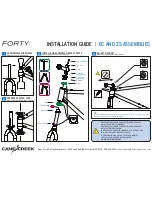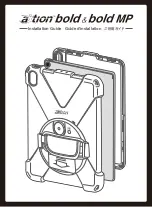
Pacbrake is a registered trademark of Pacbrake Co.
HP10002 & HP10089 AMP AIR SUSPENSION KITS
L5682
5
L5682_REV19_ECN1-2194_01.13.2020
STEP 8
STEP 9
STEP 10
STEP 11
8
CHECK THE CLEARENCE
Check the clearance around the brake lines and carriage bolts. The brake line
must not touch the carriage bolts, adjust if necessary. Once alignment of the air
spring is correct, tighten the two 1
1
/
4
carriage bolts to 20 ft-lbs 27 N•m, and then
torque the 4 axle strap carriage bolt nuts also to 20 ft-lbs 27 N•m.
Repeat on the other air spring.
NOTE:
Install the clamp provided to secure the emergency brake cable to the
driver side front
1
1
/
4
carriage bolt.
9
INSTALL THE HEAT SHIELD
Bend the two center tabs of the heat shield supplied for fastening to the exhaust
pipe as shown.
Attach the heat shield with the gear clamps supplied to the exhaust pipe to protect
the air spring.
10
Provided in the basic air spring kit are two fill valves, the most common place to
install them is to replace the license plate fasteners with the fill valves. Alternative
-
ly, two holes can be drilled in a convenient location. Install one airline provided,
route the nylon hose to an air spring fitting, cut the hose and connect to the air
spring fitting. Repeat with the other fill valve. Secure airlines with the tie-straps
provided away from moving items and heat sources.
If an in cab inflation kit is being installed, follow the instructions provided with it.
NOTE:
This kit contains push to connect fittings, using scissors or wire cutters
to cut the nylon airline will distort the line and cause the connection to leak. THE
AIRLINE MUST BE CUT OFF SQUARELY WITH A SHARP RAZOR KNIFE.
Moisten the end of the airline prior to inserting it into the fitting and push it in
until it stops.
IMPORTANT! Double check all the fasteners are torqued to specification.
11
LEAK CHECK
Inflate both the air springs to 90 PSI, use a dish soap and water mixture on all
airline connections to detect air leaks. Repair as necessary and retest. Inflate your
air springs to a predetermined value, then the following day recheck the pressure,
if one or both the air springs have lost pressure a leak is present, the leak must be
repaired, then retest until no leaks exist.
SPECIAL NOTE:
Retorque all the fasteners after the first 500 miles of driving.
























